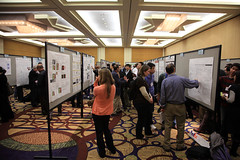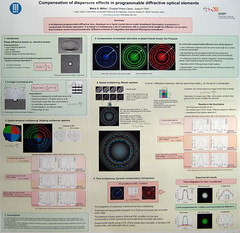

|
Archive
Blog
Cast
Forum
RSS
Books!
Poll Results
About
Search
Fan Art
Podcast
More Stuff
Random
Support on Patreon |
|
New comics Mon-Fri; reruns Sat-Sun
|
1 {photo of an apple; in the background is a descendant of Isaac Newton's apple tree, at Trinity College, Cambridge}
1 Caption: The shoulders of giants
|
First (1) | Previous (3235) | Next (3237) || Latest Rerun (2589) |
Latest New (5195) First 5 | Previous 5 | Next 5 | Latest 5 Annotations theme: First | Previous | Next | Latest || First 5 | Previous 5 | Next 5 | Latest 5 This strip's permanent URL: http://www.irregularwebcomic.net/3236.html
Annotations off: turn on
Annotations on: turn off
|
 Cathode ray tube TV screen. Glowing because of energy quantisation. |
On one level, this is really very easy to understand. The idea that energy can only occur in whole number multiples of some small amount, rather than any amount whatsoever, seems completely absurd at first sight. It's so ridiculously counter-intuitive that we have a strong gut feeling that it's just wrong. That it must be wrong.[1]
Mostly this stems from the fact that it's not apparent to us in our normal everyday experiences. It's so unapparent that the idea didn't occur to anybody until the eve of the 20th century. Max Planck came up with it, and then even he didn't believe it for a decade.
This is one of the first things to know about science. It explains the universe and how it works, but it doesn't always do so in the most intuitive, understandable, or indeed believable way. Many of the things discovered by science are so contrary to everyday human common sense that our first, gut reaction is to reject them as false. To give science its due, you need to get over this reaction and examine what it's saying and, most importantly, why it's saying it.
 Scientists at work. Understanding and criticising each other's work. |
This is the mechanism of peer review. To get something published in a reputable scientific journal, you need to submit your work with enough details to make your procedures and logical deductions transparent. The work is vetted by a panel of experts in the field. They may not necessarily agree with your conclusions, but if your methods are documented and they can't find a mistake in them, you can see your work in print. Now the real review starts, as every scientist in the field pays attention and, if your work claims to be of some significance, some of them try to see if they can reproduce your results, checking you haven't made any errors along the way. If they can reproduce them, your work will receive support and corroboration, and its standing will improve. If they can't reproduce it, or find flaws in your methods or analysis, that will come out as well.
Laid on top of this idealised mechanism are of course the very human personalities and desires of individual scientists. Scientists can be egotistical and have their own pet theories about things. If you publish something that contradicts them, they may go out of their way to prove you wrong. One of the best confirmations you can get for your work is to have someone else try to disprove it, only to discover that you did in fact do everything right. Scientists do not jump on a bandwagon; you need to convince them with a strong chain of evidence and argument that they cannot easily refute or blame on less than thorough work.
 Science laid bare. There is no place for errors or false observations to hide. |
This is another hallmark of a scientist. They change their minds. They change their minds because, no matter how fervently they believe something, or want to believe something, they accede to the standards of observation, experiment, peer review, and independent verification. Science is about finding how reality behaves, not about making people comfortable and confirming their beliefs and desires.
At this point some of you are probably thinking something like, "Uh-huh. I don't think so. Scientists are arrogant, stubborn bastards who push their own agendas and don't listen to anyone who might say they're wrong." Sure, some of them are like that. Some members of every profession are like that. Scientists are only human like everyone else. But that attitude is not conducive to success in science.[2] To be successful in science you have to be humble. You need to know when to admit you're wrong, and move on. The few arrogant, stubborn scientists that we see are ones nearing the end of their careers, whose opinions have become hardened by the process we call aging. Scientists are not immune to the inevitabilities of human frailty.
And so new generations of scientists come along and challenge what went before. They too need to be convinced that the scientific orthodoxy is real, and if there are cracks in it, you can rest assured that they will find them and probe them like a tongue worrying an annoying hole in a tooth. Incorrectness in science cannot last forever, it is continually under assault.
 Gravity works whether you believe it or not. Me tossing an apple into the air, in front of a descendant of Isaac Newton's apple tree at Cambridge University. (It came down again.) |
And the final thing I want to mention is opinion. Opinion is a popular thing these days. For many issues that we have to deal with in our complex, modern lives there is no objective best answer, so multiple different opinions can be more or less equally valid. Everyone has an opinion, and we've been encouraged to think that many different people with different opinions have valid viewpoints. This is a useful social tool for avoiding conflict and for getting along with people. So it's become more and more common to express personal opinions, and for people to feel entitled to their opinions.
This can, alas, be counterproductive when it comes to science. I know today's topic may come across as a lot more ranty than I normally write, but if there's just one thing you take away from this today, it's this:
In science, opinions count for nothing. Whatever you think about a scientific subject, there is an underlying fact beneath it, and you are either correct or incorrect. Someone might think a certain virus causes a particular disease; someone else might think it doesn't. These opinions are not equally valid; one is right, and one is wrong. If you give them both equal weight on the social principle that all opinions are worth listening to, patients are going to die.
 Whipple Museum of the History of Science, Cambridge University. |
And on the flip side, it's very hard for a false belief to survive the gantlet of the scientific method. Any scientist who claims a new finding is subject to the full scrutiny of peer review. Any chink in its armour, any single fact or observation that contradicts it, and the claim will be rejected.
The things that survive this relentless weeding out of falsehood become the pillars of our scientific understanding of the universe. A single observation that contradicts these theories can bring the whole edifice down. Science does not sweep inconvenient facts under the rug; it demolishes the broken bit of the house and rebuilds anew.
Science has given us marvellous theories with unprecedented explanatory power. Einstein's theories of special and general relativity. The standard particle model. Atomic theory. Quantum mechanics. The laws of thermodynamics. Genetics. Evolution. The germ theory of disease. Plate tectonics. The Big Bang. These theories bring understanding and meaning to our world. They make sense of a confusing cosmos, of the incredible complexity of the universe around us. Everything we know - everything - makes more sense when considered in the light of these wonderful, glorious triumphs of the collective human endeavour.
These theories did not achieve their exalted positions through weakness. Any one of them could be brought down and destroyed by a single errant observation. That such destructive observations do not exist, and have not been found despite many people searching for them, is testament to the solidity of their foundations. They are built on the rock solid work of thousands of scientists, probing for cracks and having to be convinced afresh with each generation. They do not explain our world because a bunch of people believe in them. They do so because they reflect deep, underlying truths about how our universe works.
That we have the capacity to discover these things, verify them, communicate them, and understand our world and ourselves through them is one of the most marvellous aspects of the human condition.
[2] Unless you happen to be the one in a million unsung genius who actually happens to be right about something new and groundbreaking, but unable to gather enough evidence to support it. You hear the story about the stubborn scientist holding out against orthodoxy until proven right in the end, because it's dramatic, not because it happens all that often. Most stubborn scientists who hold out against orthodoxy are simply wrong. In the fine words of Carl Sagan: "The fact that some geniuses were laughed at does not imply that all who are laughed at are geniuses. They laughed at Columbus, they laughed at Fulton, they laughed at the Wright brothers. But they also laughed at Bozo the Clown."
|
LEGO® is a registered trademark of the LEGO Group of companies,
which does not sponsor, authorise, or endorse this site. This material is presented in accordance with the LEGO® Fair Play Guidelines. |